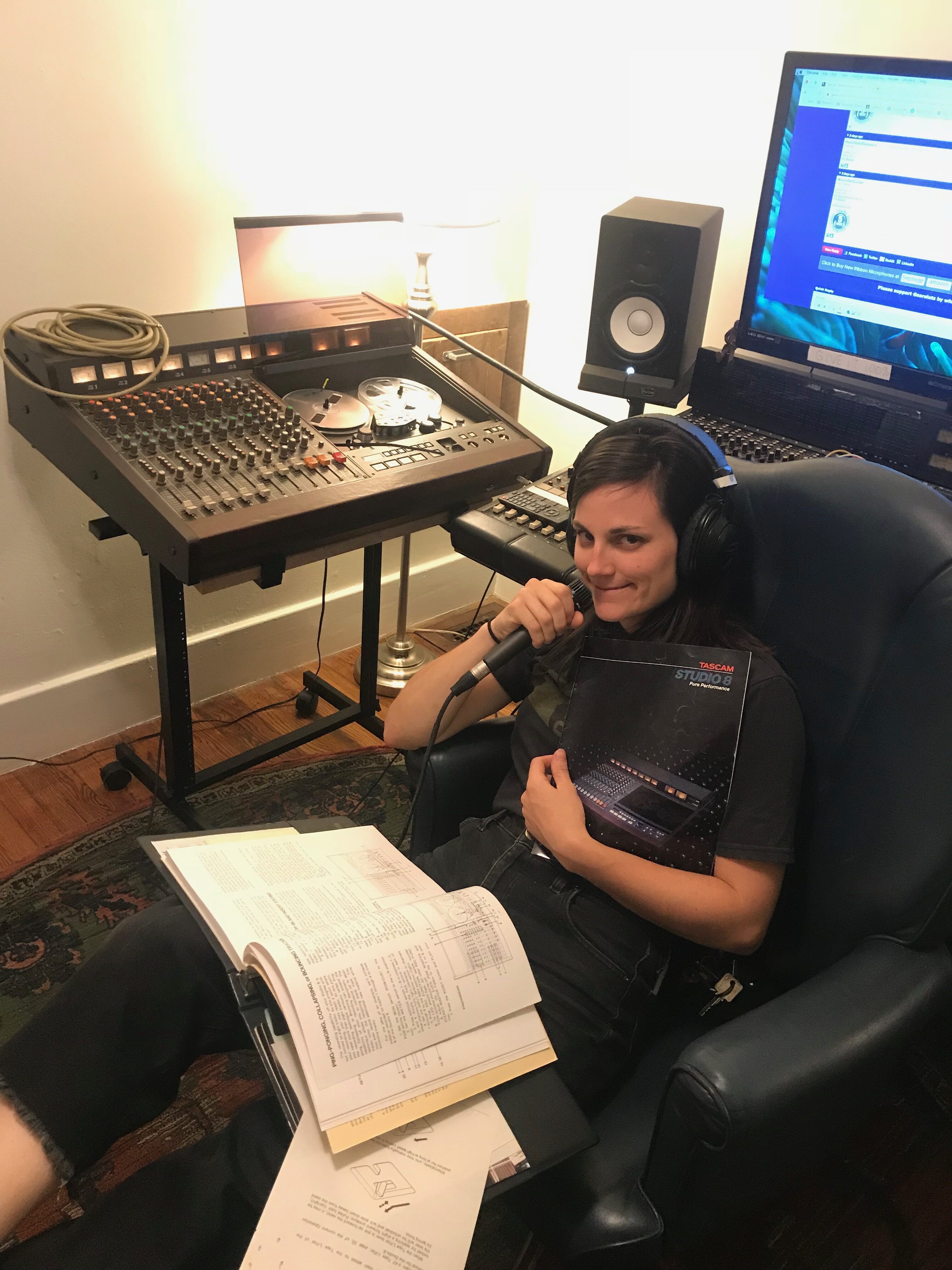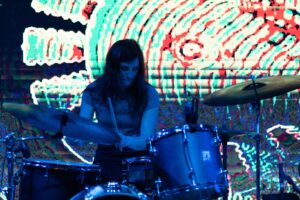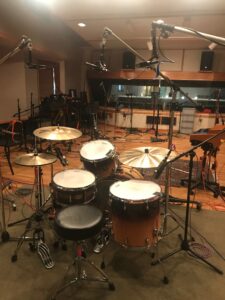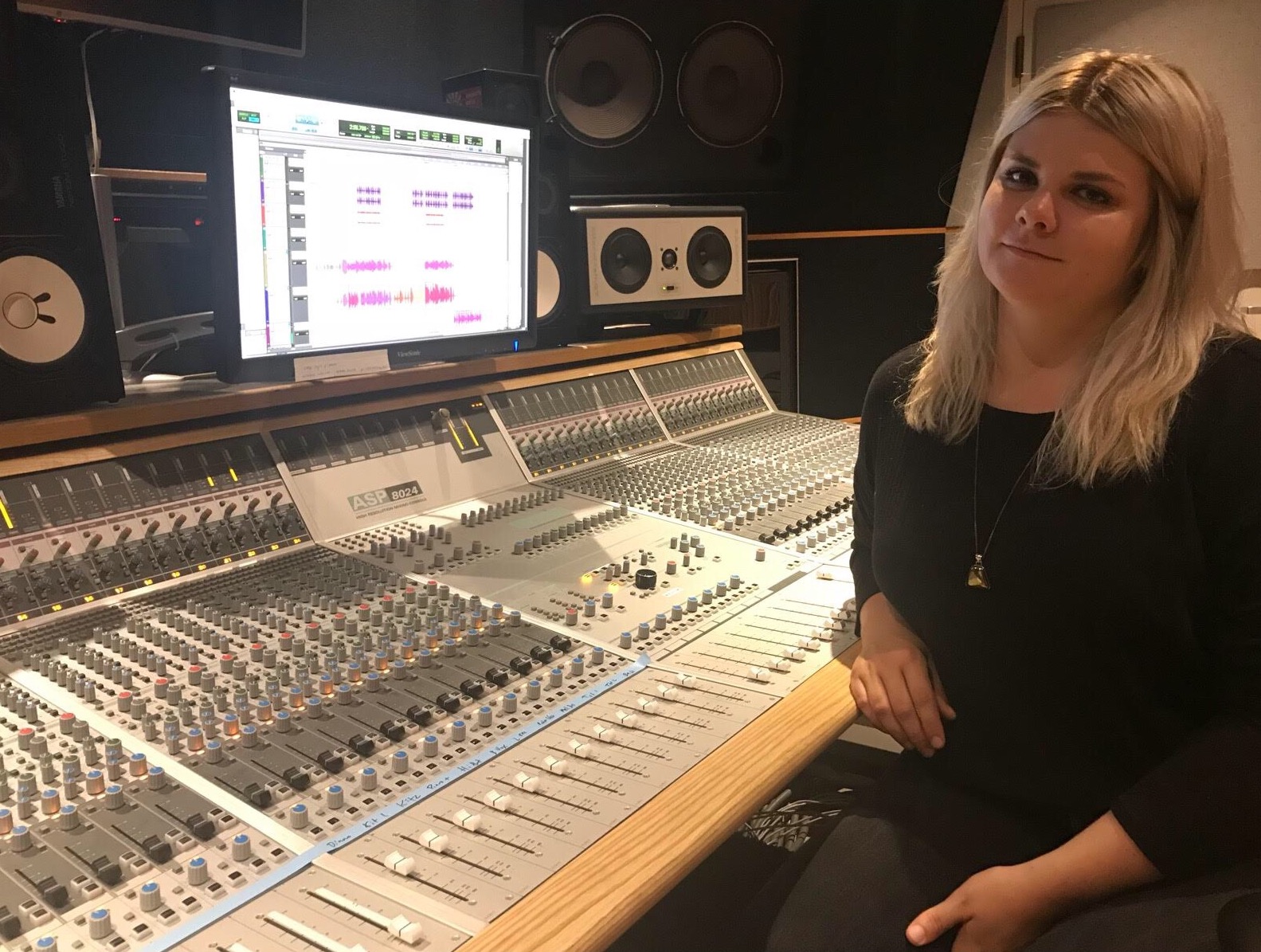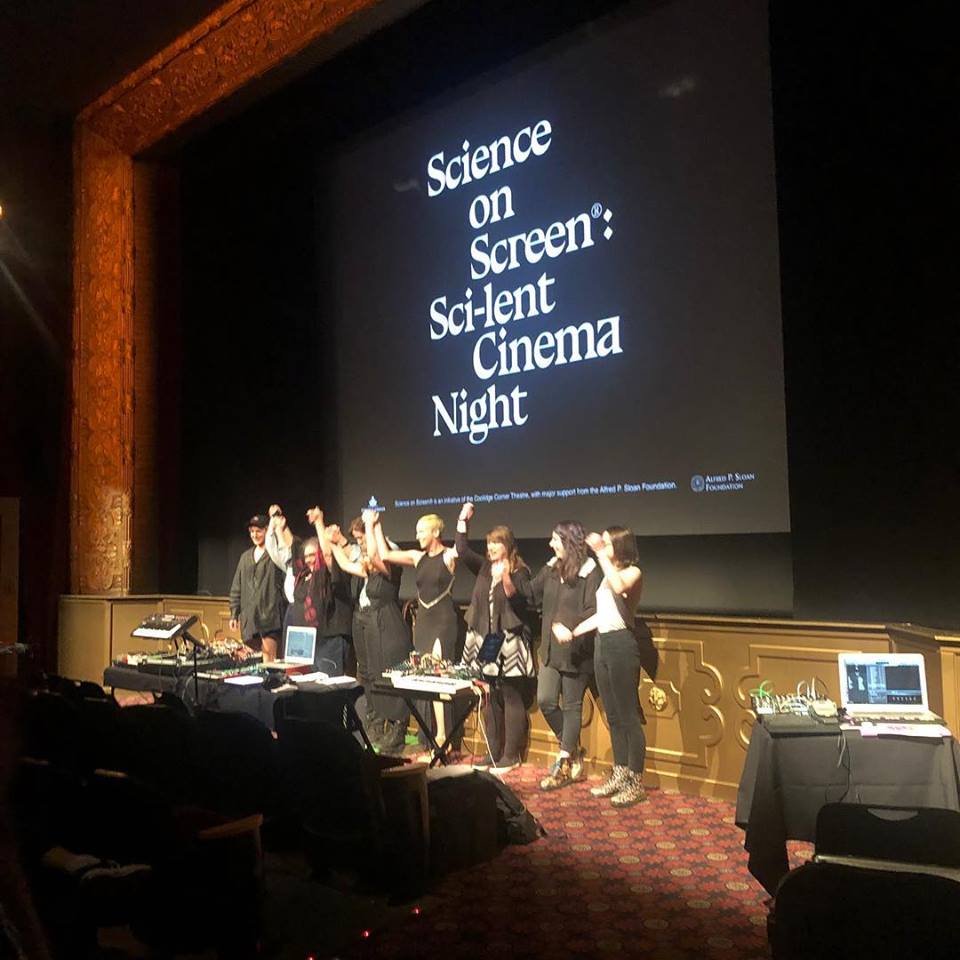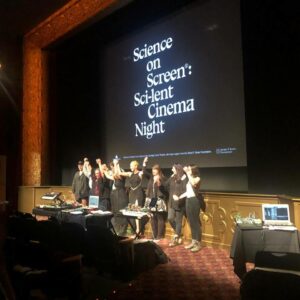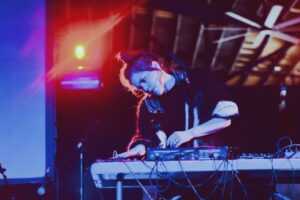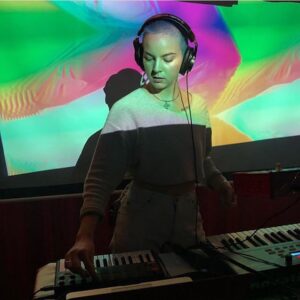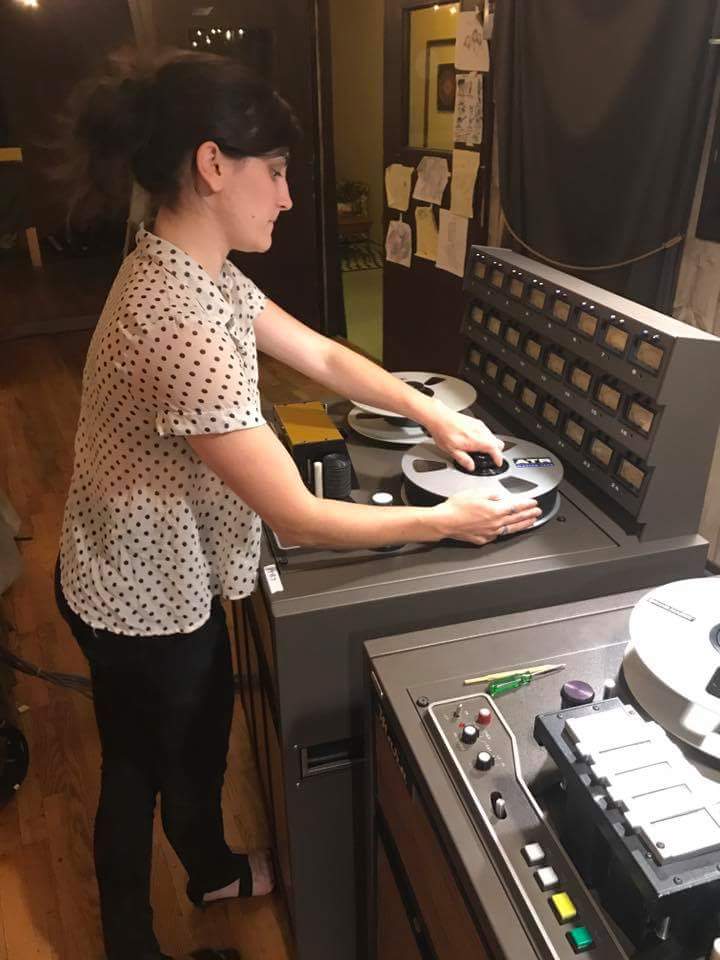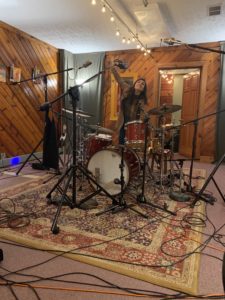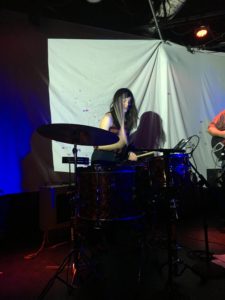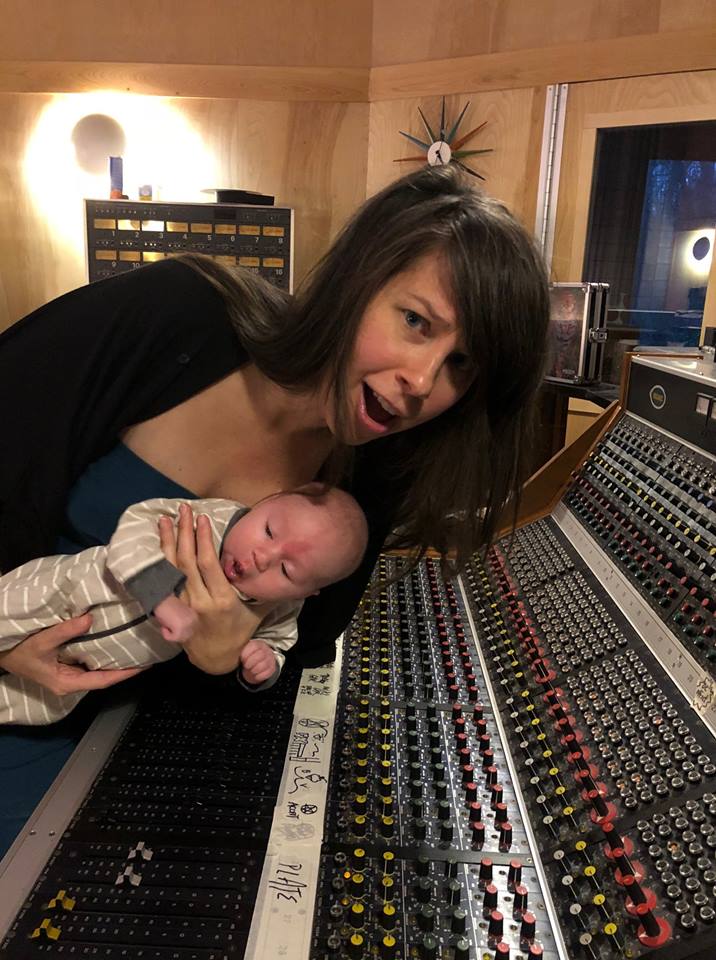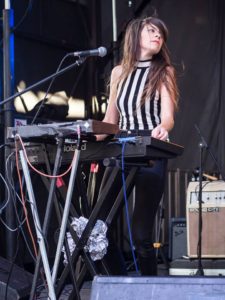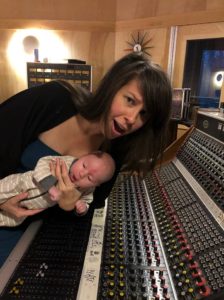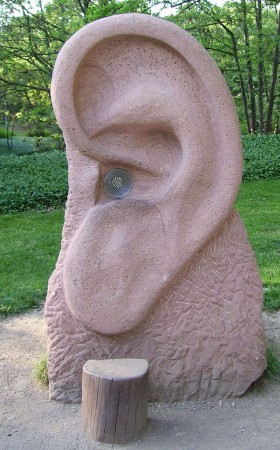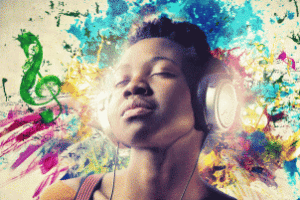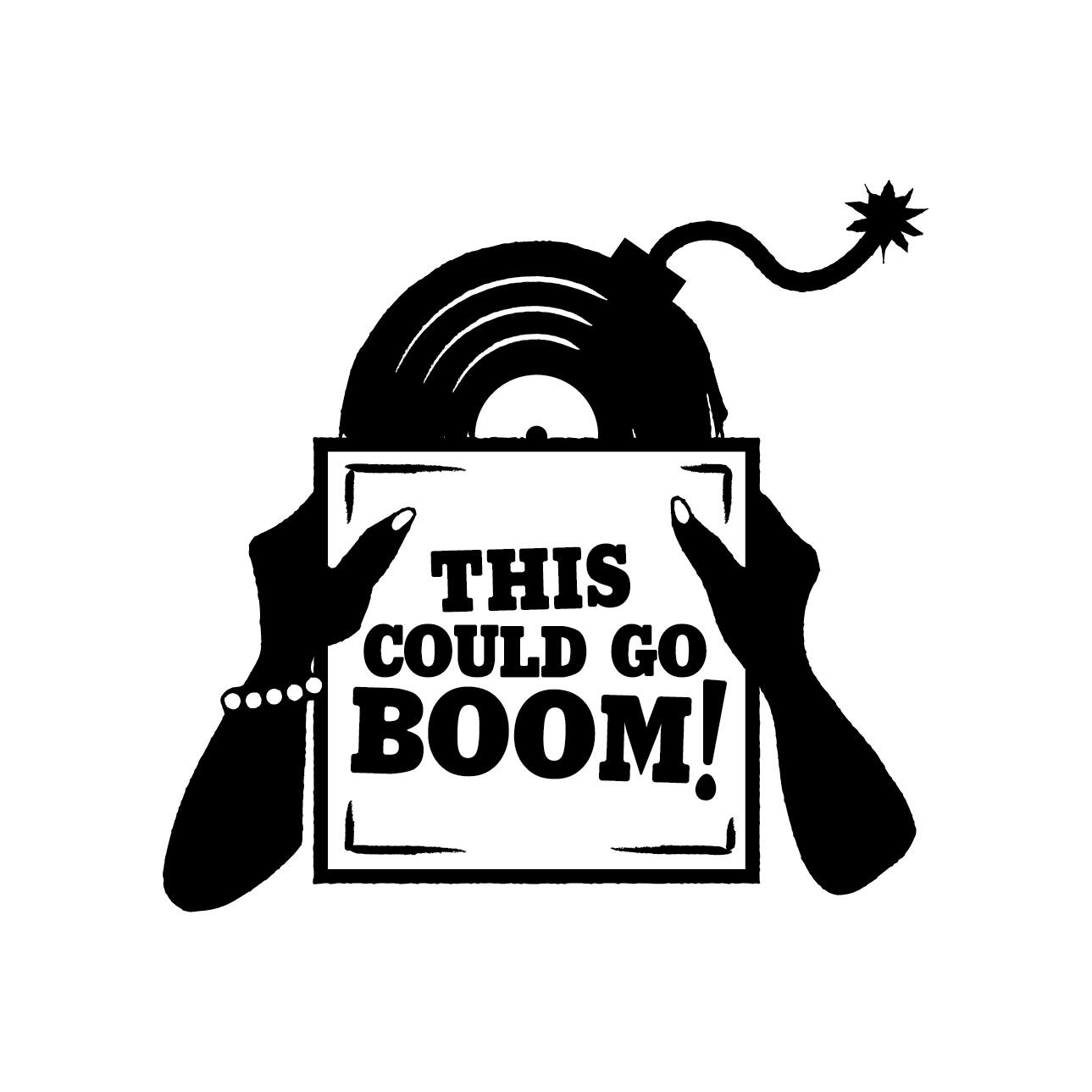
Interview with Erin Frisby of This Could Go Boom!
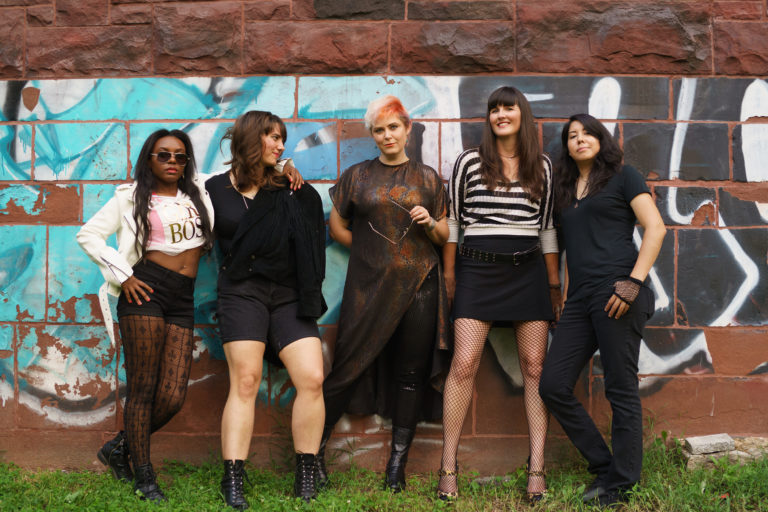
The members of OSYX and the team behind This Could Go Boom!, from left, Robzie Trulove, Maya Renfro, Erin Frisby, Ara Casey, and Selena Benally.
I recently spoke with Erin Frisby, one of the founders of Washington, DC-based grassroots non-profit This Could Go Boom! (TCGB!). Erin is a Soundgirls member, engineer, multi-instrumentalist, and member of DC-area bands The OSYX and FuzzQueen. TCGB! was founded a little over a year ago as a far-reaching community resource with a focus on helping women, non-binary, and femme artists, engineers, students, and music professionals find their voice. TCGB! Provides several resources that strengthen the DC music community and provide a framework for artists to gather and connect. Since its inception, the group has been busy curating improv jams and workshops, presenting monthly showcases, and has released and promoted the first full-length album on their roster.
This Could Go Boom! has garnered a strong following in the DC area, due in part to their commitment to staying flexible and adapt their goals and plans as the group grows. I was excited to catch up with Erin and hear about their mission moving forward and recap on their year. Her band, The OSYX, left for a tour on October 30. If they’re heading to your city, be sure to catch them.
What was the process of formulating the idea for This Could Go Boom? How did you turn that idea into an organization?
The idea for This Could Go Boom! happened organically. The band, The OSYX, was meeting regularly to write music and rehearse. Being a band made up of women, we were soon commiserating about discrimination, assault, and harassment that we had experienced individually in the course of collaborating with other musicians, booking shows, learning in music, and in venues. We also talked about the harder to pin down barriers that come from traditional socialization and deeply embedded systematic discrimination in all walks of life. We were also always marveling over the incredible talent in our region, the outstanding women and nonbinary people whose shows we attended, who we played with. We started to draw connections between the statistics on women in the music industry and the personal experiences of our bandmates and our community members. We were also reveling in the growing support for our musical project and began to consider a crowdfunder to put out a record. The more we talked, the more we realized that we weren’t going to feel fulfilled by just releasing one project and calling it a day. We decided to leverage our momentum to create something that would be bigger than our one band, something that would be community-driven would belong to everyone and would have a lasting impact. We arrived at the idea of a mission-driven record label that could work to redefine the industry from the inside.
You all recently changed your mission statement. In what ways does your new statement reflect your goals in the upcoming year?
Originally we conceptualized a record label that would provide resources for women and nonbinary songwriters, musicians, and recording engineers. Over our first year of existence, we expanded to include performance and networking opportunities, conversations, workshops, and community outreach experiences like our Safer Scenes workshop for venues. It became clear that the label was one branch of a more significant effort that was always going to be responding to community need in all areas of the music landscape from performance to leadership, music journalism, sound arts, and music consumption. We also wanted to be clear that we weren’t looking to represent one genre or limiting our reach to music that specifically addresses social issues. The name This Could Go Boom! came from an episode of Handmaid’s Tale, where several letters outlining the lived experience of imprisoned women become the catalyst for change. We realized that our strength was the ability to provide space, access, and opportunities for women and nonbinary musicians to spark change in their own ways and through their own stories.
What roles in your community do you think are lacking that you hope to fill?
Representation is lacking in all aspects of the music industry for women and nonbinary people. A report from the Annenberg Inclusion Initiative shows that in 2017 82.7% of artists were men, of 2,767 songwriters credited, 87.7% were men, out of 899 people nominated for Grammys 90.7% were men, and only 2% of recording engineers are women. When intersectional identities are considered, representation becomes an even greater issue, with trans women, nonbinary people, Women of Colour, Indigenous women, queer women, women not fitting a narrow vision of beauty, older women and disabled women having the least access to opportunities in music. The danger of this is that only specific stories are being told and those stories become our ‘normal,’ they continue to carry forward as defining aspects of our culture. Consider how we use music to connect spiritually and socially, to define memories, to celebrate, to mourn, to accompany and influence film and consumerism. Music is far-reaching, and who gets to determine how we do those things and define those things is important. Representation for women and nonbinary people in the musical landscape can and does often take the form of tokenism, flat stereotypical representation that leaves many feeling othered and nonnormal. This is cultural isolation. Our hope is to listen to our community to develop networks, programs, and opportunities that directly challenge these numbers.
What have been some of the most rewarding aspects of starting TCGB? Most challenging?
Seeing and hearing how our efforts have inspired individuals is the most rewarding aspect of what we’re doing. Every time a youth lets us know that they feel inspired and empowered to make music, every time someone tells us that they feel inspired to pursue music that they may have put off before, every time we see connections being made between artists and community members and music fans all of the fatigue from endless volunteer hours falls away.
Like many grassroots charities, one of the challenges we face is learning as we go. We rely on our community members to let us know when we’re missing the mark and when we’re potentially causing harm. Like all other nonprofits, funding is a crucial issue. We’re currently totally community funded, and we rely on donations, no matter how big or small, to continue to offer programming.
In the process of working with people in your community, what have you found to be one of the most pressing needs to be met?
There is a great need for legitimate pathways to success in music for women and nonbinary folks. We’ve heard over and over again that recording engineers, in particular, are looking for mentorship. The ability to tap into revenue streams like fair performance compensation, festival representation, licensing and sync opportunities, and time to practice and play are things we hear about from our community a lot. Some members of our community are primary caregivers or single parents, many work day jobs, or have student debt, or are living paycheck to paycheck. Many experience mental illness or other health concerns. The luxury of making music can feel out of reach when people are faced with obstacles like these. Traditional routes for music education, touring and unpaid internships can be prohibitive. We’re exploring solutions like avenues into licensing and sync, childcare during rehearsal time, and alternative learning opportunities.
How have you all been received in your community? What kind of spaces (if any) are there for marginalized folks to gather and create?
Washington D.C., where we’re based, has the benefit of a diverse community and a long history of DIY music. All Ages spaces are very important to our work as are accessible spaces. Like many cities, we’re experiencing the major effects of gentrification. There isn’t a ton of affordable rehearsal space in our area, and we’ve witnessed venue discrimination against Black made music in particular. We’re working hard to unite scenes here and leverage resources for all genres of music.
Are there any satellite recording studios or other community resources/spaces that you all rely on?
We’re really fortunate to have partnerships with a ton of local businesses that have stepped forward. 7DrumCity, a local music school, venue, and rehearsal facility, stepped forward to support very early on. There’s also RockinRepair, Gold Pants Rental, local photographers and promoters like Roxplosion and Good Foot Media, recording studios such as Machine Room Studios and Ivakota. We’ve also enjoyed a lot of support from the Smithsonian this year during their Year of Music. We’ve participated in the Smithsonian Folkways Festival and gave a presentation at the Hirshhorn Museum. Local labels like Dischord and Verses have been wholly supportive with friendly advice, and 202Creates at The Mayor’s Office has also been a great supporter.
What workshops do you have coming up?
We’re relaunching our intro to improv music workshop at 7DrumCity at their monthly Potluck Jam on December 1st. This workshop is for people of all skill and experience levels including absolute beginners to come together to practice listening and contributing to music-making in a group. We’re also working on developing a recording engineering program comprised of sequential workshops, hands on experience, and mentorship for those interested in entering the profession. Our Safer Scenes workshop for venues facilitated by Shawna Potter from War On Women and hosted by Dangerously Delicious Pies DC was very successful and we hope to make that an annual occurrence. Some other workshops that have been requested include pedalboard 101, vocal master classes, touring and booking, and DIY merch creation.
Your first album release happened this month! (Read a review here). Can you talk about what went into that on your end and what you learned in the process?
We learned so much! This is great because our idea was to experiment on our own band, The OSYX first. We self-produced our recording with Chris Stelloh engineering the record pro bono at our band house and a friend’s historical house nearby. Our greatest takeaway was the amount of time it takes to bring an album to fruition. The hours of planning, writing, recording, manufacturing, artwork, and merchandising, and promoting took up a good part of a year.
How do you plan to expand in the next year? Is there anything that you’re particularly excited about that you can talk about?
We’re really excited about expanding our board. From our inception, it’s been our goal to have a board that reflects our community, and we’re about to launch a campaign to accomplish that. At the moment the core of the board is the band, The OSYX. We’ve always considered the organization to belong to the community though and we’re looking forward to bringing more voices into our decision-making. We also launched a junior board/street team called The Boom Team that promoted and produced All Ages shows this summer. We’re looking forward to expanding that effort. We’ll also be announcing our next release soon, which is very exciting.
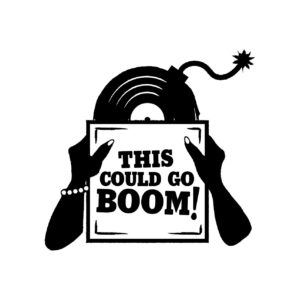 Get in touch with Erin and follow along with what This Could Go Boom has going on:
Get in touch with Erin and follow along with what This Could Go Boom has going on:
Everyone is encouraged to follow us at thiscouldgoboom.org @thiscouldgoboom
Facebook group This Could Go Boom! Listening Room.
We rely on community input and individual donations. We welcome comments and suggestions and personal stories, we have a form online for those interested in participating in a performance or putting music out on the label on our website, and we’re always happy to accept donations. We’re currently hoping for someone to step forward with an $80 a month recurring donation that will allow us to join a membership organization for independent labels that will help us to source opportunities for our community.
